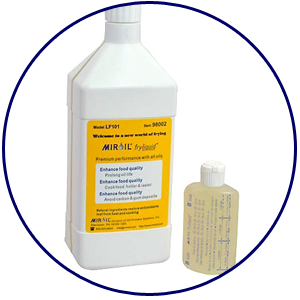Why use Oil Stabilizers?
Factors Affecting the Frying Efficiency of Oils
Deterioration of oils and fats increases rapidly with temperature.
Deterioration is tolerable up to 165/170C,but at 180/185C deterioration becomes more rapid. Deterioration is the breakdown of the oil molecule and the formation of Free Fatty Acids or FFA’s which has an impact on food quality.
The major component of food is water. Water boils at 100C(+/-) a few degrees depending on the food being cooked), thus the food is cooked around 100C.
Fat is a means of transferring heat from the burners to the food and the effect on cooking depends on two factors:
- The temperature difference between the fat and the food - the higher the fat temperature the faster the heat enters the food.
- The heat transfer coefficient of the contact surface, for example if a layer of insulation surrounds the food it stops heat moving across the surface,( compare the lagging of a hot water tank).
Ask the question? - As the fat gets older why does cooking time get longer?
Answer - Because the heat transfer across the surface of the foods is poorer.
Ask the question? - How do you bring the cooking time down?
Answer - Increase the cooking temperature.
Lets face it, this is the standard practice with most fast food outlets. As the oil ages the quality of the food deteriorates, becomes greasier and less appetising. This can be observed in many many outlets. Too often fry cooks attribute this to the oil colour but this is not true. Different oils darken under heat in different ways. Palm oil darkens quickly others take longer. Its like people- some brown some go red in the sun.
As a result of this dilemma, and in particular with the high cost of oil, we have to look hard and long at another solution - that is how we can improve the heat transfer coefficient, to move heat from the fat to the food, so that we can get the heat into the food just as efficiently from fat at a lower temperature and reduce the deterioration which causes high oil usage through throw away..
First of all we have to understand, why the heat flow into the food reduces as the oil ages. Oil goes off quicker using spiced chips than normal chips.
What do the additives do to food do to the oil? It is not simply a matter of burning and/or producing free fatty acids. One can cook efficiently in oils with high free fatty acids. The problem is that any metallic material introduced with the food coating etc react with the free fatty acids to produce soaps and surfactants. Salt or hard towns water used for producing batters etc will provide an abundance of trace metals.
These products affect the surface of the food to be fried. (Consider a nice clean car if you throw a cup of water over it, it flows off and leaves little balls of water. If you now throw a cup of soapy water over it, it spreads over the surface and wets the surface). Soap and surfactants wet the surface of the food with two effects:
- The wetted surface allows the free movement of fat into the product and water out of the product.
- The wetted surface prevents heat from transferring into the food.
The net result is drier uncooked food, burned on the outside with more fat on the inside.
To overcome this problem we need to remove as many of the soaps and surfactants as possible as and when they are produced.
This can be achieved by using either Miroil Frypowder or Miroil fryliquid, which are surface active absorbents, treated with a citric acid. When mixed with the oil they absorbs soaps and surfactants throughout the day controlling the oil, minimising the absorption into the food thus producing a better product with a longer fat life and thus more cost effective.
When your oil is supplied by your oil Company it contains an antioxidant which is put into the oil to prevent rancidity. This is boiled off the first time that the oil is used and heated above approx 150C. Both Miroil Frypowder and Miroil fryliquid contain antioxidants which will be continuously active in the frying oil up to 180C and when the Miroil programme is followed will ensure that you are always protected.
Miroil Frypowder can be left in the fryer whilst food is cooking and does not stick to the food, but remains in the oil. If it ended up on the food it would not cause any harm, but would just make it feel a bit gritty. Both Miroil Frypowder or Miroil fryliquid in addition by reducing the soap in the oil, reduce the build up of carbon deposits on the fryer walls making fryers cleaner and avoiding boil outs.
There is no mystique about the above, which is documented, in technical literature available throughout the World.
The secret of good frying is:
- Know your oil temperature and keep it in the 170C range where it breaks down less.
- Filter your oil daily either manually or with a machine, but remember that filtration alone can not remove soluble breakdown material.
- Use Miroil Frypowder or Miroil fryliquid daily to absorb soluble surfactants constituents from the oil and maintain food quality.
- Miroil Frypowder also acts as a filter aid assisting in the removal of particles when filtering your frying oil.



